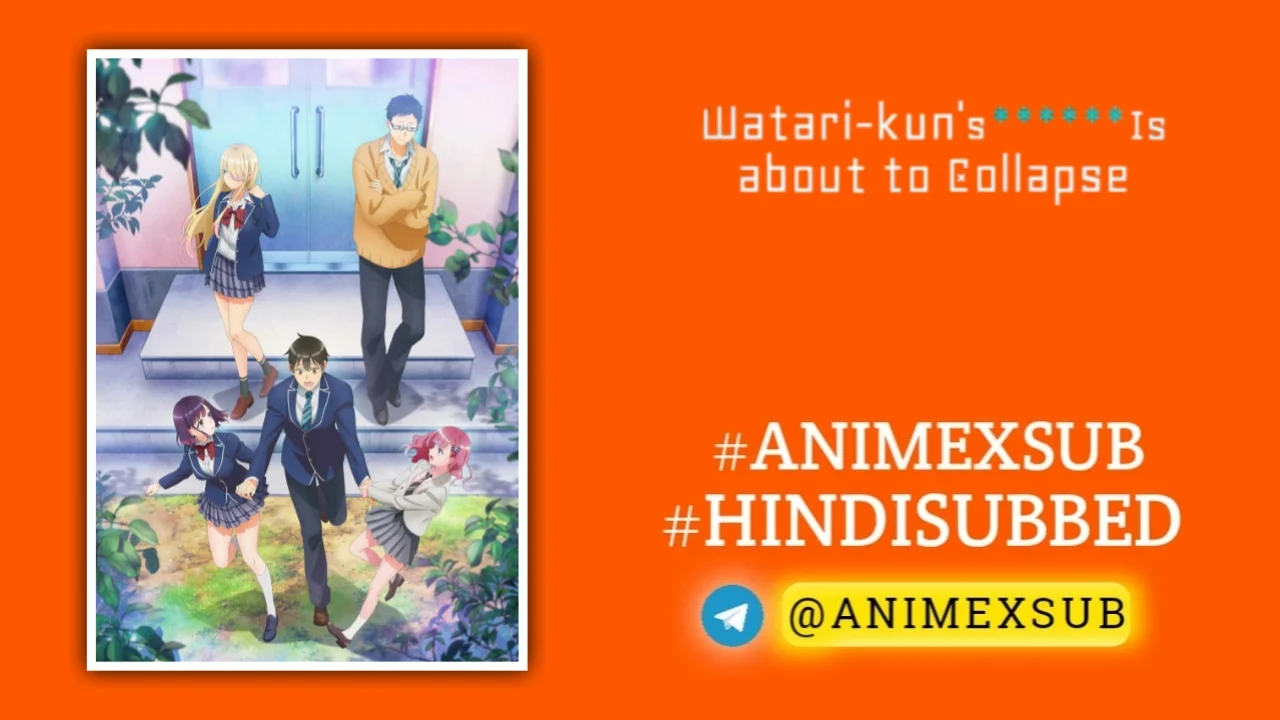
Solo Camping for Two Hindi Subbed [05/24] | Futari Solo Camp Hindi Sub!!

Futari Solo Camp
Solo Camping for TwoSynopsis
Gen Kinokura, 34 years old. A solitary camper who cherishes his alone time in nature, Gen enjoys his usual solo camping trips. However, he unexpectedly encounters Shizuku Kusano, a complete beginner in camping. Reluctantly, Gen ends up camping with Shizuku, despite it being the last thing he wanted to do. What will become of Gen’s peaceful camping life now that it’s turned upside down by this new companion? (Source: Pony Canyon)
Watch Trailer
Characters
Solo Camping for Two (Futari Solo Camp) Season 1: A Grounded Ode to Nature and Unlikely Bonds
Solo Camping for Two (also known as Futari Solo Camp), a 2025 anime adaptation of Yudai Debata’s manga, delivers a refreshing take on the slice-of-life genre, blending the meditative solitude of camping with the unexpected warmth of human connection. Season 1, spanning 24 episodes, follows the journey of Gen Kinokura, a 34-year-old solo camping enthusiast, and Shizuku Kusano, a 20-year-old novice camper whose chaotic energy disrupts his peaceful retreats. What begins as an accidental encounter evolves into a unique partnership that explores the beauty of nature, the art of camping, and the subtle growth of two contrasting souls. This article dives deep into why Solo Camping for Two Season 1 stands out as a compelling, introspective, and quietly revolutionary addition to the iyashikei (healing) anime landscape, while critically examining its strengths and flaws.
A Fresh Spin on the Camping Narrative
Unlike its genre cousin Laid-Back Camp (Yuru Camp), which celebrates group camaraderie and cozy aesthetics, Solo Camping for Two leans into the introspective allure of solo camping while paradoxically exploring companionship. The premise is deceptively simple: Gen, a grizzled city worker who finds solace in the quiet of nature, crosses paths with Shizuku, an exuberant but ill-prepared junior college student determined to master solo camping. Their dynamic—Gen’s stoic introversion clashing with Shizuku’s relentless optimism—sets the stage for a narrative that balances humor, education, and emotional depth.
What makes the series unique is its refusal to romanticize or overly sentimentalize the outdoors. While Laid-Back Camp often frames nature as a picturesque backdrop, Solo Camping for Two portrays it as a raw, sometimes unforgiving force that demands respect and preparation. The show’s camping tips, delivered through Shizuku’s learning curve, are practical and detailed—covering everything from choosing a three-season tent to packing light for foot-based camping. These segments, often narrated by Gen with a mix of exasperation and expertise, feel like a love letter to the craft of camping, appealing to both novices and seasoned outdoor enthusiasts. For example, Episode 3’s breakdown of sleeping bag insulation ratings and their suitability for Japan’s varied climates is both accessible and genuinely useful, a rarity in anime that often prioritizes aesthetics over substance.
Character Dynamics: A Study in Contrasts
The heart of Solo Camping for Two lies in its two leads, whose chemistry evolves from friction to mutual understanding. Gen Kinokura, voiced by Daiki Hamano, is a compelling protagonist—a man in his mid-30s who carries the weight of urban fatigue. His love for solo camping isn’t just a hobby; it’s a deliberate escape from the grind of Japanese work culture, a theme subtly woven into his character without heavy-handed exposition. Gen’s gruff demeanor and preference for solitude make him relatable to introverts, and the show refreshingly avoids framing his introversion as a flaw to be “fixed.” Instead, it celebrates his self-sufficiency while allowing room for growth through his reluctant mentorship of Shizuku.
Shizuku Kusano, brought to life by Mizuki Niizaki’s vibrant performance, is both the series’ greatest strength and its occasional stumbling block. Her boundless energy and naivety inject humor into the narrative, but her initial recklessness—showing up to a campsite with minimal gear and no plan—can feel grating, especially in the early episodes. Critics have noted that Shizuku’s insistence on joining Gen despite his protests borders on intrusive, raising questions about the show’s perspective on boundaries. However, as the season progresses, Shizuku’s character deepens. Her enthusiasm stems from a genuine desire to connect with nature, and her culinary contributions—mouthwatering dishes like campfire-grilled mackerel or instant ramen elevated with foraged herbs—become a bridge between her and Gen. The food porn, a staple of food-centric anime, is executed with care, though some viewers may find the preparation sequences overly didactic.
The age gap between Gen and Shizuku (34 and 20) adds a layer of complexity. While the manga occasionally hints at romantic undertones, the anime wisely leans toward a mentor-student dynamic, avoiding clichés that could alienate viewers. Their relationship feels authentic because it’s not rushed—by Episode 12, their bickering gives way to quiet moments of mutual respect, like when Gen teaches Shizuku to read a topographic map under a starlit sky. These scenes capture the series’ core: two people, initially at odds, finding common ground in nature’s vastness.
Visuals and Sound: A Mixed Bag
Visually, Solo Camping for Two is a point of contention. Produced by SynergySP, the animation struggles to capture the manga’s evocative wilderness environments. While the manga’s art is praised for its detailed, almost tactile depiction of Japan’s forests and rivers, the anime’s backgrounds often feel flat and repetitive, with “muddy-looking” scenery that fails to convey the majesty of the outdoors. This is particularly disappointing for a show about nature’s allure, where breathtaking vistas could have elevated the emotional weight of Gen and Shizuku’s journey. Character animation fares slightly better, with Gen’s weathered expressions and Shizuku’s animated gestures adding personality, but the overall production feels underfunded, a stark contrast to the lush visuals of Laid-Back Camp.
The sound design, however, is a standout. The ambient sounds of crackling campfires, rustling leaves, and distant streams create an immersive experience that compensates for the visual shortcomings. The opening theme, “Akari wa Tōku” by Skirt, is a hauntingly beautiful track that captures the solitude of camping, while the ending theme, “Futari Camp” by Masayoshi Ōishi featuring Special Others, injects a warm, folksy vibe that mirrors the evolving bond between the leads. These elements make the series a sensory delight, even when the visuals falter.
Themes and Subtext: Solitude vs. Connection
At its core, Solo Camping for Two is a meditation on solitude and connection, a theme that resonates deeply in a world increasingly defined by urban isolation. Gen’s preference for solo camping reflects a universal desire for peace in a chaotic society, while Shizuku’s intrusion challenges the notion that solitude is the only path to fulfillment. The show doesn’t judge either perspective but instead explores how both can coexist. Gen’s gradual acceptance of Shizuku doesn’t diminish his love for solitude; rather, it enriches it, showing that shared experiences can complement personal reflection.
The series also subtly critiques modern life’s disconnect from nature. Gen’s camping rituals—setting up a tent, building a fire, cooking with minimal tools—are portrayed as acts of rebellion against the convenience-driven urban world. Shizuku’s reliance on konbini-bought ingredients, while practical, sparks debates between the characters about authenticity in camping, adding a layer of philosophical depth rarely seen in slice-of-life anime.
Critical Reception and Cultural Impact
Solo Camping for Two has garnered mixed but passionate responses. Fans of the manga, which has sold over 3 million copies by November 2024, praise the anime for its fidelity to the source material’s tone and educational content. On platforms like MyAnimeList, some viewers have called it “cozy, charming, and refreshingly simple,” though its initial 6.54 rating suggests polarization, possibly due to comparisons with Laid-Back Camp. Critics have noted the show’s pacing issues, particularly in the early episodes, where Shizuku’s over-the-top antics and the jarring transitions to instructional segments disrupt the flow. However, the two-cour (24-episode) run allows the series to find its rhythm, with later episodes delivering quieter, more introspective moments that reward patient viewers.
The live-action adaptation, which aired from January to February 2025, has been less warmly received, with reviewers citing tonal inconsistencies and overacting, particularly from the actress playing Shizuku. The anime, by contrast, benefits from its medium, allowing the exaggerated expressions and comedic timing to feel more natural.
Why It’s Next-Level
Solo Camping for Two Season 1 is a next-level experience because it dares to be unapologetically niche. It’s not just a camping anime; it’s a character-driven exploration of solitude, mentorship, and the healing power of nature. Unlike many slice-of-life series that lean heavily on moe or fanservice, this show prioritizes substance—offering practical camping knowledge, nuanced character growth, and a realistic portrayal of human connection. Its flaws, like the lackluster animation and uneven pacing, are outweighed by its sincerity and willingness to let quiet moments speak louder than dramatic plot twists.
For viewers who crave a slower, more contemplative anime that doesn’t shy away from real-world applicability, Solo Camping for Two is a rare gem. It’s a reminder that sometimes, the most profound adventures happen not in epic battles but in the rustle of leaves, the glow of a campfire, and the unexpected company of a stranger who becomes a friend.
Final Thoughts
Solo Camping for Two Season 1 is a love letter to the outdoors and the people who find themselves in it. It’s not perfect—its animation and early pacing issues may deter some—but its heart lies in its authenticity and respect for its subject matter. Gen and Shizuku’s journey is a testament to the idea that even in solitude, there’s room for connection, and even in the wild, there’s space for growth. For those willing to pitch a tent and settle in, this series offers a rewarding, soul-soothing escape.
Watch it on Crunchyroll, where it streams with subtitles, or check out the manga for a deeper dive into Yudai Debata’s vision.
Support Our Anime Community!
Love watching the latest anime? Help us keep uploading new episodes by join telegram channel ❤️
Join Now!









